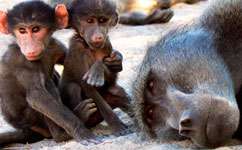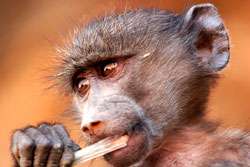Promiscuous baboons benefit from father's care

Young baboons that spend time with their fathers get better meals and reach sexual maturity sooner, scientists say.
Previously, it was thought that male baboons might find it difficult to recognise their own offspring.
But this latest research, by Dr Elise Huchard of Cambridge University and an international team of researchers, demonstrates for the first time how young baboons can benefit from intimate and fruitful relationships with their fathers.
'This has been a turning point in our understanding of how baboon fathers interact with their offspring,' says Huchard.
'The males could be spending their time pursuing other mating opportunities, so it is really surprising to see them having such close associations with their offspring.'
Baboons live in promiscuous societies in which one female will often mate with many males.
As a result, scientists thought that males would struggle to work out which offspring belonged to them.
To test this, Huchard and her colleagues started by capturing the baboons and identifying the fathers of each infant using DNA techniques.
The team trailed the baboons through the Tsaobis Nature Park in Namibia for up to 15 hours a day, closely monitoring their every move. Over time, they got to know the troop well.

'It's a fantastic experience. You are following each individual for little slices of their lives so you really get to know their personal stories,' says Huchard.
The team noticed that fathers tended to accompany their offspring most when they were feeding, often granting them access to richer food patches.
Offspring also spent more time with their father when there were other males around and when mother was out of sight, perhaps portraying a desire for protection.
The research is published in Behavioral Ecology and was part-funded by a Natural Environment Research Council fellowship. The study is part of an on-going body of work towards understanding the ways in which baboons interact and thrive in promiscuous societies.
More information: Huchard, E. et al. Paternal effects on access to resources in a promiscuous primate society, Behavioral Ecology, 2012, doi:10.1093/beheco/ars158
Journal information: Behavioral Ecology
Provided by PlanetEarth Online
This story is republished courtesy of Planet Earth online, a free, companion website to the award-winning magazine Planet Earth published and funded by the Natural Environment Research Council (NERC).



















